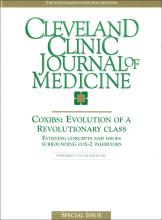ABSTRACT
Nonsteroidal anti-inflammatory drugs (NSAIDs) are among the most widely used of all drugs and are the most common medications used by persons aged 65 years or more. NSAIDs have a number of side effects, of which the most prevalent and serious is gastrointestinal (GI) toxicity. GI side effects of NSAIDs range from dyspepsia and gastroduodenal ulcers to serious, potentially fatal GI complications including bleeding and perforation. Serious GI complications often lack warning signs; knowledge of risk factors for NSAID-related gastropathy can identify patients at high risk, allowing for initiation of the appropriate therapeutic intervention. Risk factors include advanced age, NSAID dose, prior GI complications, infection with Helicobacter pylori, and use of corticosteroids and anticoagulants. There are few well-established strategies to prevent GI complications in NSAID users. Risk assessment and cotherapy with acid suppressors (H2-receptor antagonists and proton pump inhibitors) or prostaglandin replacement (misoprostol) and H pylori eradication are beneficial. Cyclooxygenase-1 (COX-1) is a key enzyme in gastroprotective mucosal defenses, and the best way to prevent GI toxicity is to avoid drugs that inhibit COX-1. Clinical studies of the COX-2–selective inhibitors rofecoxib and celecoxib have demonstrated efficacy equivalent to nonselective NSAIDs with lower rates of GI side effects (for example, incidence of endoscopic ulcers equivalent to placebo). Selective COX-2 inhibitors (coxibs) provide effective treatment of pain and inflammation while reducing risk of gastropathy.
- Copyright © 2002 The Cleveland Clinic Foundation. All Rights Reserved.






